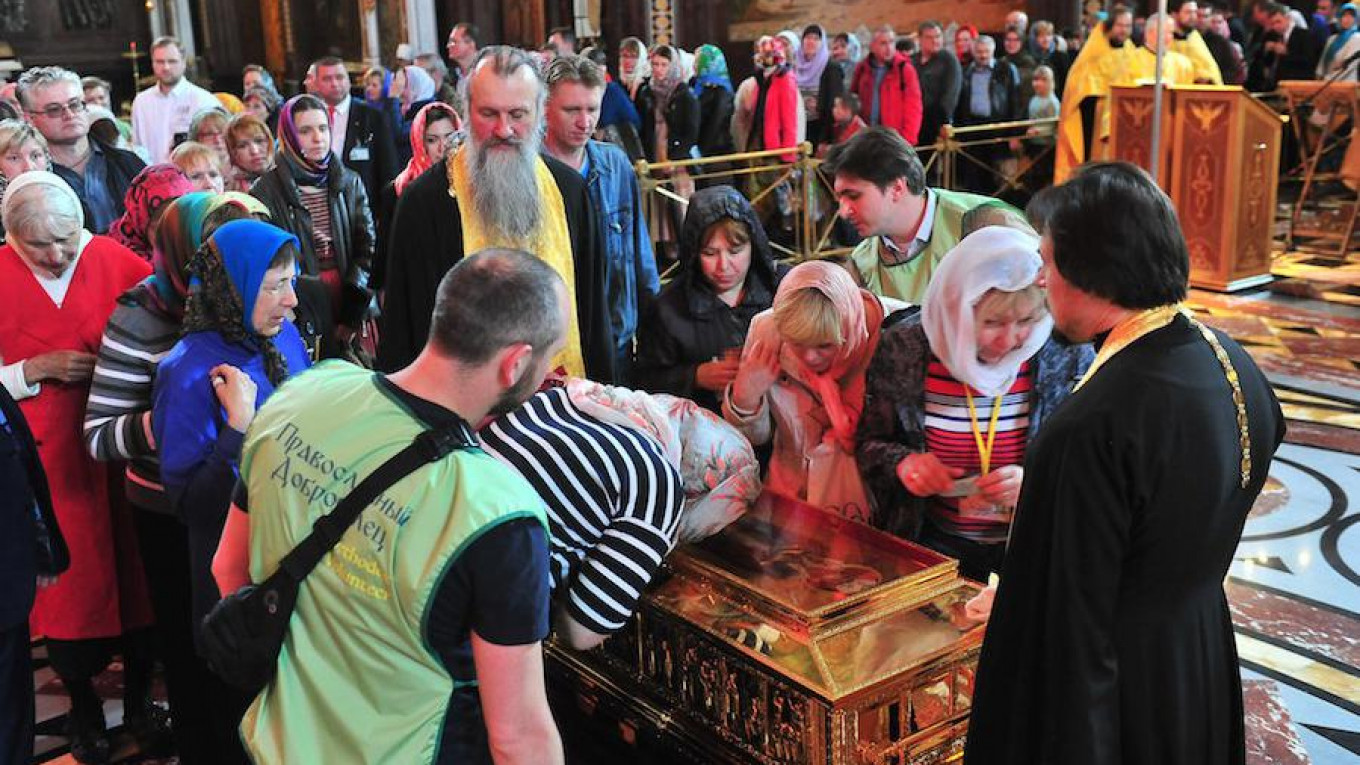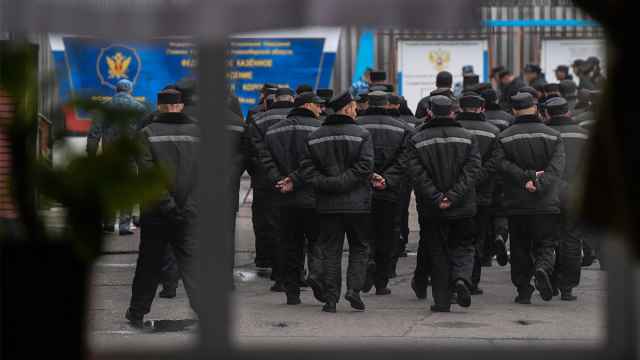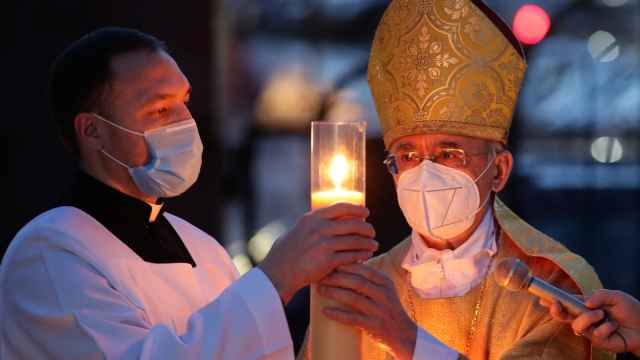The two-kilometer-long line waiting to view the sacred remains of St. Nicholas the Wonderworker is something of a miracle itself.
Orthodox believers, gypsies, atheists, selfie-lovers, beer-drinkers, supporters of the political opposition, and bathers from a nearby swimming pool all congregate outside Moscow’s Cathedral of Christ the Savior for their turn to venerate the saint’s bones.
“You call this a line?” says Elena from a region south of Moscow. “It’s more like a retreat. The sun is shining, the river is shimmering, there are riverboats.”
The rib bone of St. Nicholas, a miracle worker in the Orthodox faith, is on display in Moscow after almost a millennia in Italy. The relics were loaned to Russia after a deal brokered between the Catholic and Orthodox Churches which fell afoul in 1054.
“I remember lining to see the Virgin in 2011,” she says passing through a metal detector under the bridge. “That was something else entirely. Hellish cold, never-ending line. This is a treat!”
Elena has come to ask St. Nicholas for the repairs on the road to her summer cottage to be completed quickly. “Anyway, it would be a sin to miss something so sacred,” she adds.
The line is broken into sections along the sidewalk of the Moscow riverbank. Every 15 minutes, the police allow people in one section to walk the short distance to the next.
Empty tour buses with their doors thrown open line the road next the line. Anyone is welcome to sit down inside if they get tired standing. Most people choose to stand—at least at the beginning.
“It’s better to stand,” says Olga, who wears a traditional headscarf and clutches a Bible. “That is the least we can do for the sake of visiting something sacred: stand, endure, and pray.” Looking at a woman who has just returned from a stand marked “Drinks and Ice Cream” holding a frozen treat, Olga adds: “And not eat ice cream.”
The avenue is dotted with vendors, along with buses and outdoor toilets. All the conveniences are available.
“I’m here to appeal to St. Nicholas on behalf of Alexei Navalny,” says Mikhail, a middle-aged Muscovite, referring to the leader of the political opposition.
"I know that Navalny is a believer. I follow his blog. He probably doesn’t have the time to come and stand in this line himself — he has to open new campaign offices. So I decided to come and ask for a miracle: that he will win next year’s presidential election.
Along the line volunteers—mostly women—in bright “Orthodox volunteer” vests speak with the pilgrims and answer their questions. In the areas along the riverbank between
the groups of line-standers, they call out, “Christ is risen!” to which the people nearest them eagerly respond, “Truly he is risen!”
Those waiting closer to the cathedral mostly sigh set and the air to cool, others for the rain not to start, and still others in hopes that the line will move faster.
From time to time, the Orthodox volunteers ask people to allow people in wheelchairs, on crutches, or young children to move to the front of the line. “I have bad legs,” shouts out one elderly woman as she trots past the crowd, another dozen or so people trailing in her wake.
“They don’t look so bad to me,” one woman says in protest, tripping the offender with her cane. An altercation ensues. The police step in. They implore people not to swear, push or shove. Now both women, having yelled and made up, pass everyone on their way to the front of the line.
Olga has traveled from a town in the Tver region. She will pray to the sacred remains for her friend who wants a child. “She has been trying to get pregnant for two years. I came to make this request for her.” Olga later admits that neither she nor her friend believe in God. “But you never know.”
Two young women in tights pucker their lips, narrow their eyes, and hold out a selfie stick. “Which hashtag should we post this to?” one asks the other.
Nearby stands a lady in a Louis Vuitton headscarf. She turns away from the two and crosses herself. Then she pulls a pink iPhone from her bag: "Are you coming soon? I’m in front of Peter the Great right now. No, it’s not the front of the line.
The closer the line draws to the cathedral, the less civilized the people become. Young children scream. People push in front of each other. “Don’t worry — another hour or so and then we’ll go swimming,” one elderly woman consoles another.
Elza and Nellie had planned to visit the nearby outdoor swimming pool near, but decided to make a detour for the remains. But they miscalculated the time and energy required for it. After three hours of standing, they reassure each other — loudly — that soon they’ll be in the nice, cool, water and in a horizontal position. “But at least now we’ve been at the center of the action,” one tells the other.
Near the cathedral entrance, a female volunteer wearing a scarf and “Orthodox volunteer” vest looks dreamily at her phone and sings: “Lost on you, lost on you,” accompanying a popular song by the group LP.
The crush continues inside the cathedral. The line divides between those buying candles, those blessing icons, and those who want to buy something from the church boutique.
“I’ve really had enough of this,” complains the woman holding the bible as she begins crossing herself. “Where the hell are you?” the woman in the Louis Vuitton scarf says into her iPhone. Another woman, pushing her husband ahead in a wheelchair says “Everything will be fine. You’ll see.”
Pilgrims have to walk quickly as they pass the golden sarcophagus holding the holy remains.
“Finally! I am so hot and tired,” one man tells a woman back on the street. “I need a beer this minute.” “Me, too. I’d have a pale beer,” she agrees, removing her scarf. A man with a foreign accent walks by them, makes the sign of the cross and says, “God bless you both.”
A Message from The Moscow Times:
Dear readers,
We are facing unprecedented challenges. Russia's Prosecutor General's Office has designated The Moscow Times as an "undesirable" organization, criminalizing our work and putting our staff at risk of prosecution. This follows our earlier unjust labeling as a "foreign agent."
These actions are direct attempts to silence independent journalism in Russia. The authorities claim our work "discredits the decisions of the Russian leadership." We see things differently: we strive to provide accurate, unbiased reporting on Russia.
We, the journalists of The Moscow Times, refuse to be silenced. But to continue our work, we need your help.
Your support, no matter how small, makes a world of difference. If you can, please support us monthly starting from just $2. It's quick to set up, and every contribution makes a significant impact.
By supporting The Moscow Times, you're defending open, independent journalism in the face of repression. Thank you for standing with us.
Remind me later.






